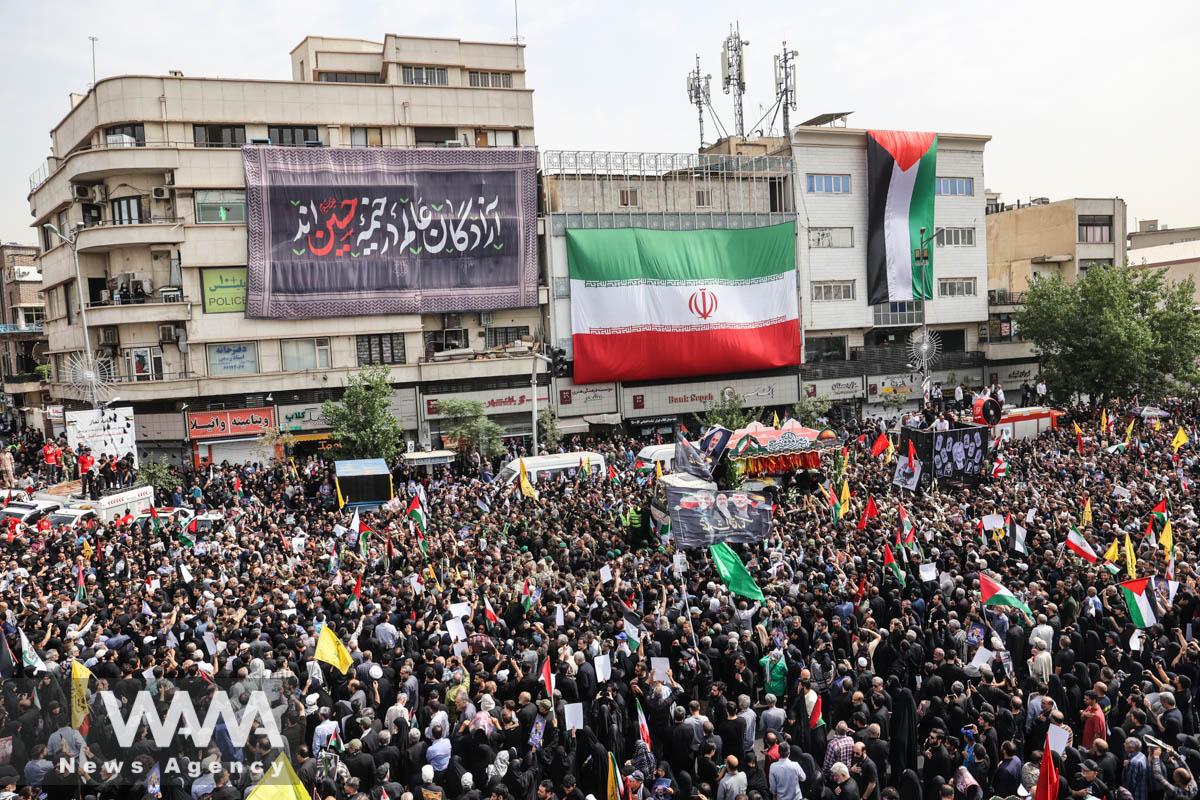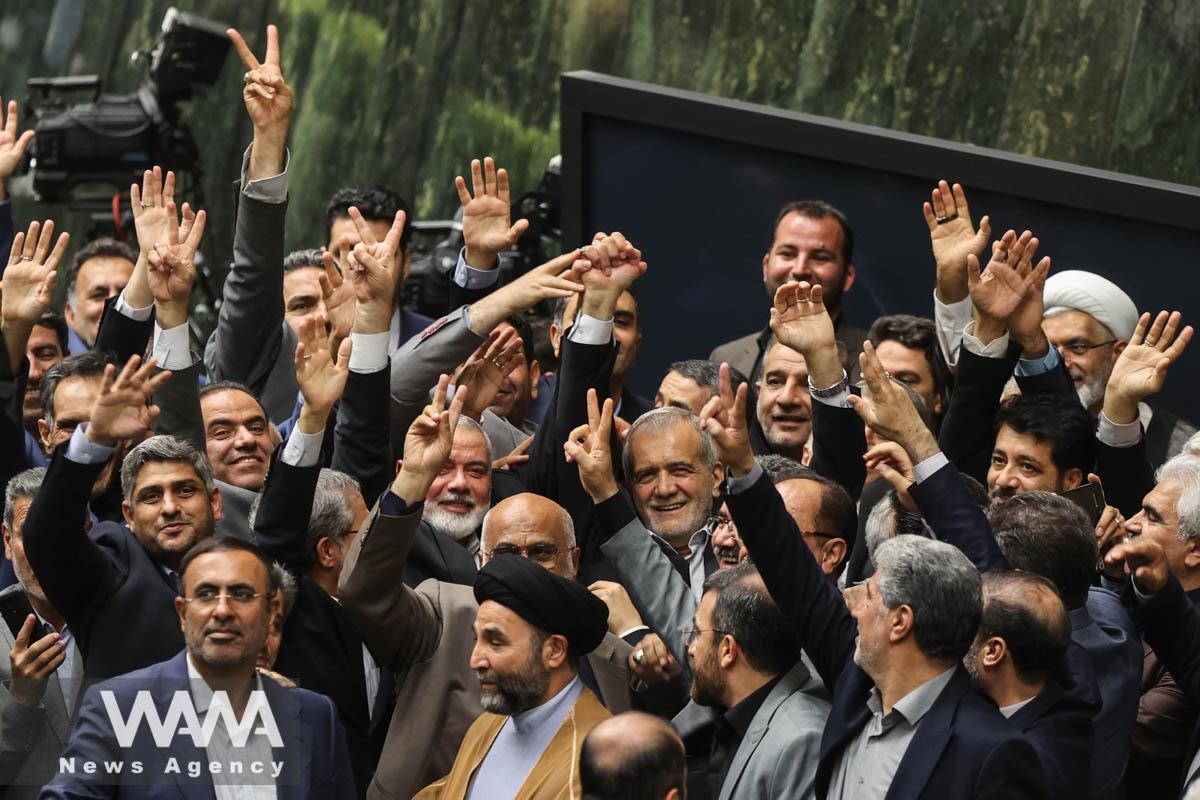Why Tehran? Behind Israel’s Selection of a Terrorist Target
WANA (August 03) – Around 2:20 a.m. on Wednesday, news broke that Ismail Haniyeh, the political bureau chief of Hamas, was assassinated in Tehran along with one of his bodyguards.
Hours after this news spread, Khalil al-Hayya, a senior Hamas member, confirmed in a press conference on the assassination of Martyr Ismail Haniyeh: “Witnesses have confirmed that a missile struck Martyr Haniyeh’s room.”
Initial details of Haniyeh’s assassination in Tehran also revealed that he was staying in a special residence for war veterans in northern Tehran when he was killed by a projectile from the air.
Following the revelation of these details, questions emerged in public and on social media about Israel’s and Netanyahu’s motives for this assassination. Why was this assassination carried out in Tehran, and why exactly hours after Masoud Pezeshkian’s inauguration ceremony?
Wouldn’t it have been easier for Israel to execute this operation in Turkey or Qatar, given Haniyeh’s frequent travels to other countries where the assassination was technically possible? It appears Israel waited for his visit to Tehran to carry out the attack.

Iranians attend the funeral procession of assassinated Hamas chief, Ismail Haniyeh in Tehran, Iran, August 1, 2024. Majid Asgaripour/WANA (West Asia News Agency)
Israeli media analysts describe the assassination of Hamas leader Ismail Haniyeh in Tehran and the targeting of a senior Hezbollah commander in Beirut as an explicit challenge to Iran, potentially leading the country toward a full-scale war.
Israeli media commentators suggest that the targeting of the senior Hezbollah commander in Beirut and the assassination of Ismail Haniyeh in Tehran by Israel aims to increase pressure on Iran due to its proxy forces’ ongoing attacks on Israel during the Israel-Gaza conflict. Ron Ben-Yishai, a defense analyst for the Ynet news website, whose opinions often reflect official views, wrote: “These two eliminations… are a direct challenge to Iran and its proxy strategy.”
It is unlikely that Israel acted independently and without American coordination or approval. Haniyeh’s assassination occurred ten months after the Gaza war—a decisive war in a very small and besieged strip that is still ongoing, where Israel, despite unprecedented destruction and killing, has not achieved its goals.
In this deadlock, Israel has focused on the physical elimination of Hamas leaders and commanders over the past two months, which aligns with the US’s call for Israel to transition from intense airstrikes to targeted attacks since the beginning of the year. Previously, some Israeli sources emphasized that the US had assured Israel of support for targeted and focused attacks. The attacks in Beirut and Tehran indicate that this cooperation extends beyond Gaza to the entire region.
Global hatred towards Israel is growing daily, prompting Netanyahu to expand the scope of the war and involve the US. Under international pressure, Netanyahu decided to continue the war while also opening new fronts to alleviate US pressure—an approach seen as the best way to open new battlefronts.

The New York Times’ Fabrication about the Assassination of Ismail Haniyeh
WANA (August 02) – Fars News Agency, associated with the Islamic Revolutionary Guard Corps (IRGC) of Iran, has dismissed the New York Times’ report on the assassination of Ismail Haniyeh as a blatant and deliberate fabrication aimed at saving Israel from severe retaliation. The IRGC-affiliated news agency claims in its reports today that in […]
Opening new fronts means continuing the Gaza war and opening second and third fronts in the region. For this purpose, Israel initially started the Majdal Shams project in the Golan Heights.
The range of the Falaq-1 missile is only 10 kilometers, but the distance between Hezbollah’s first trench and Majdal Shams is 13 kilometers. Therefore, it is possible that fragments from Israeli missiles landed in this area, and Israel concocted this story to justify opening a new front.
On Tuesday (July 30), we saw Israel attack southern Beirut and assassinate Fuad Shukr. Additionally, last week, Israel attacked Hodeida port in response to Houthi Yemeni drone attacks. The third and most significant Israeli action was the assassination of Ismail Haniyeh in Tehran.
By opening these fronts, Israel aims to extend the war until November 2 and the US elections. Israel believes that Trump will take power and, for the next four years, allow Israel to continue its policies of destroying Palestinians in Gaza and confronting its enemies without concern.

Iran’s new President, Masoud Pezeshkian attends his swearing-in ceremony at the parliament in Tehran, Iran, July 30, 2024. Majid Asgaripour/WANA (West Asia News Agency)
But why was Tehran chosen for this terrorist attack? Israel could have executed this idea in Qatar, Turkey, or any other location.
It seems that the presence of a reformist government in Iran, with messages of engagement, moderation, dialogue, and negotiation, has cornered Israel and taken the initiative out of its hands. This assassination occurred immediately after the inauguration ceremony in reaction to these developments.
Masoud Pezeshkian, the elected President of Iran, has a mission that he outlined in his campaign, endorsement, and inauguration speeches. His slogan is convergence, engagement with the world, and dialogue with the United States to resolve conflicts.
This shift in Iran’s foreign policy discourse is deadly for Israel. Israel always prefers a radicalized Iran to justify its hostility towards the country.
The best period for Israelis was during Ahmadinejad’s tenure in Iran. Ahmadinejad denied the Holocaust, created numerous controversies, and ultimately placed the country under Chapter VII of the UN Charter.
When Israel sees that the Iranian people have elected a reformist president seeking engagement with the world and solving sanction issues, it resorts to a blatant terrorist act to keep Iran radicalized.

Pezeshkian: The Killers of Gaza’s Children Cannot Teach Lessons on Humanity
WANA (July 30) – Masoud Pezeshkian reacted to the crimes of the head of the Zionist regime in Gaza during his inauguration ceremony as President, which elicited strong applause from the guests of the resistance front. Masoud Pezeshkian in his inauguration ceremony in the open session of the Islamic Consultative Assembly, while welcoming the […]
This act aims to hinder Iran’s future moves on the international stage. Therefore, the choice of Tehran for the assassination location and the timing right after Masoud Pezeshkian’s inauguration align with this broader strategy. The intention is for the military to maintain a significant presence in the scene.
The Jerusalem Post notes that Israeli security forces could have killed Ismail Haniyeh in Qatar but chose Tehran to provoke Iranian officials and push them into a reaction.
Undoubtedly, Iran must respond due to the violation of its national sovereignty. However, the main issue is that this response must be designed and executed with utmost vigilance and wisdom. It remains to be seen whether this response will not only exact appropriate revenge but also create deterrence for Iran and restore the security system that Iran claims to uphold.













